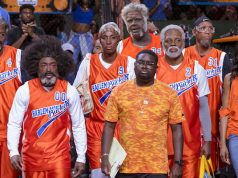Oh sure, you’d THINK Jack Black and the guy who wrote and directed “Napoleon Dynamite” would make a great team. Jared Hess is funny, and Jack Black is funny; why, together they should have newly minted comedy gold spurting out their comedy orifices!
And yet “Nacho Libre” is proof that the pairing is wrong, all wrong. Their styles are opposites. Hess’ “Napoleon Dynamite” found its humor in quirky characters who behaved in ways that, while unusual to us, were perfectly normal for them. Black, on the other hand, doesn’t play “characters.” He plays himself, mugging and smirking as if to remind us that it’s just him after all. In other words, Hess’ comedy depends on actors being fully committed to their characters and never breaking the illusion, but Black refuses to disappear into a character and revels in breaking the illusion at every opportunity.
Both styles work fine separately — Black’s “School of Rock” is a joy to watch, and the charms of Hess’ “N.D.” are, I’m sure, well-known to you — but not together. Hess hasn’t tailored his style to mesh with Black’s, nor has Black made any attempt to fit in with Hess’ sensibilities. And so “Nacho Libre” is full of merry whimsy and scattered chuckles, but never the outright hilarity it aims for.
Black plays Ignacio, a half-Mexican priest at an orphanage in a quaint, timeless village south of the border. Consigned to kitchen duties by his priestly higher-ups (“They don’t think I know a buttload of crap about the gospel, but I do,” he says), he dreams of being a masked wrestler, or luchador, so popular among the country’s ordinary folk. If he were to realize his dream, perhaps he could even make some money to improve the orphanage.
But the monastery he belongs to disapproves of professional wrestling (there’s a church I can get behind), and so he dares not mention his dream to anyone, not even the angelic Sister Encarnacion (Ana de la Reguera), whom he has a less-than-priestly crush on.
Luckily, luchadores tend to be masked. His identity concealed, Ignacio — now Nacho — pairs with a filthy, wide-mouthed street kid named Esqueleto (Hector Jimenez) to become the town’s newest wrestling sensation. Yet they can’t seem to break into the ranks of the established luchadores, and Nacho is particularly disheartened to realize his idol, Ramses (Cesar Gonzalez), is a jerk and a snob.
The screenplay (by Hess and his wife Jerusha, with help from “School of Rock’s” Mike White) finds much of its humor in the old-fashioned pastoral setting of the Mexican village being juxtaposed with modern American slang like “it sucks to be me” and “whatever.” I confess to giggling at this sort of thing oftener than I should, though it is distracting when Black not only says the line, but makes one of his trademark faces to go with it — a reminder that hey, it’s me, Jack Black, pretending to play a role for 90 minutes.
Hector Jiminez, whom the filmmakers found at open auditions on location in Oaxaca, is a gem, though. Filling the “N.D.” Pedro role as the protagonist’s so-oblivious-he’s-cool Mexican sidekick, Esqueleto gets it exactly right, delivering his silly dialogue without affectation or showiness. He has what everyone in “N.D.” had: very little professional acting experience, and thus no self-consciousness to go with it.
Apart from some uninspired slapstick (Nacho falls off a bike; Nacho catches on fire; etc.), Hess shows he’s still a savvy director who has grown since his first film. He composes interesting shots that are more than just functional (making use of Mexico’s gorgeous scenery in this case) and very effectively uses eclectic songs for the movie’s soundtrack. If he’ll branch out into other styles of humor, or find actors who can forget themselves and blend into his world, he’ll have a long, hilarious career.
But I can’t completely dismiss this one. The film is so good-natured and pleasant and simple that I can’t not recommend it. It’s a disappointment in a lot of ways, but it’s sure an upbeat one.
B- (1 hr., 30 min.; )





